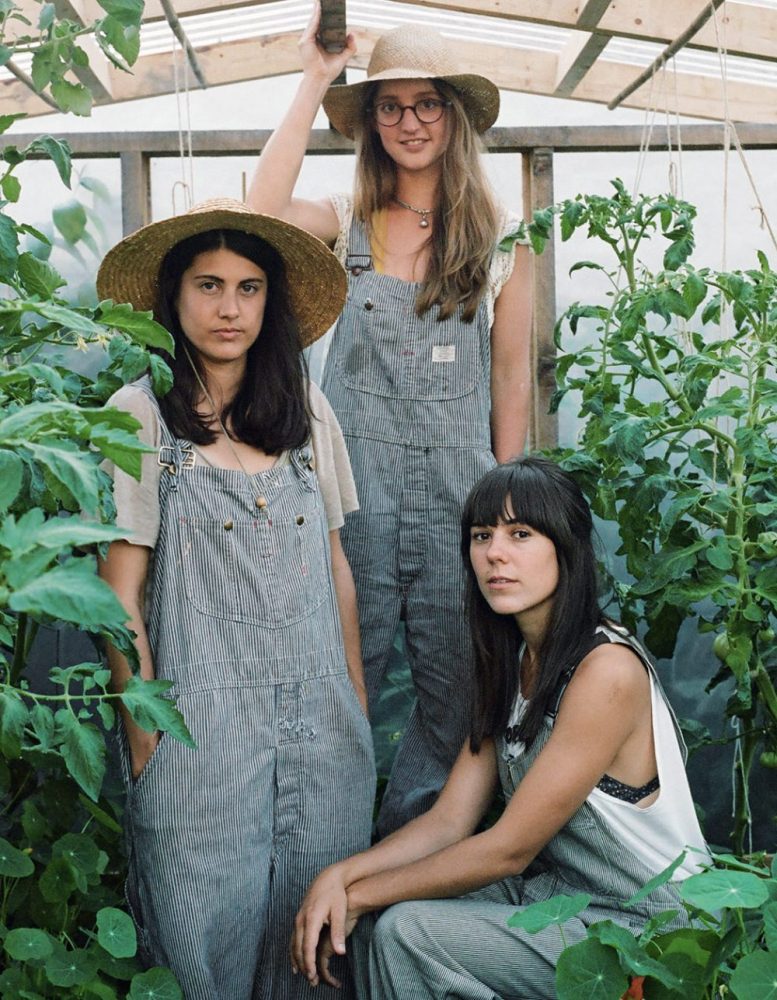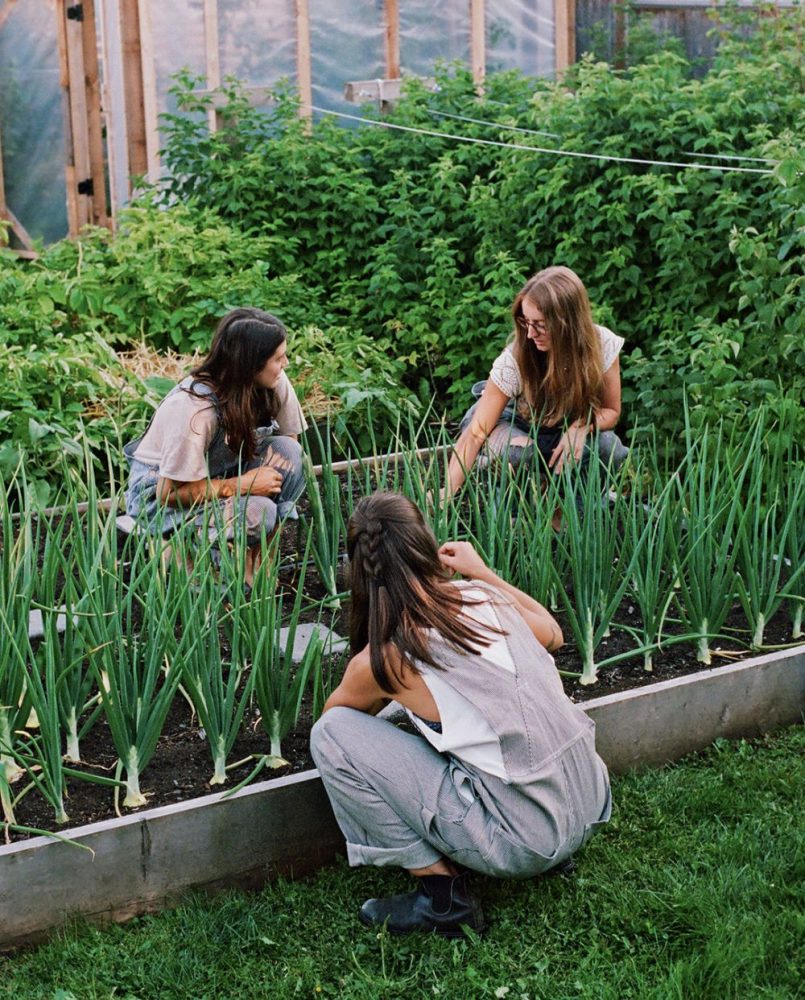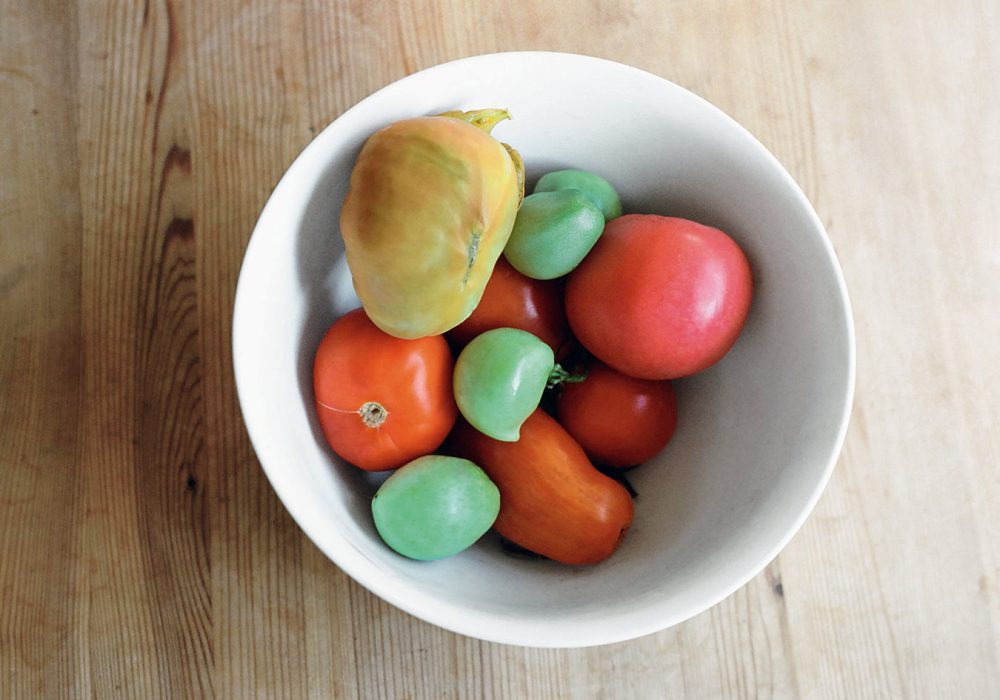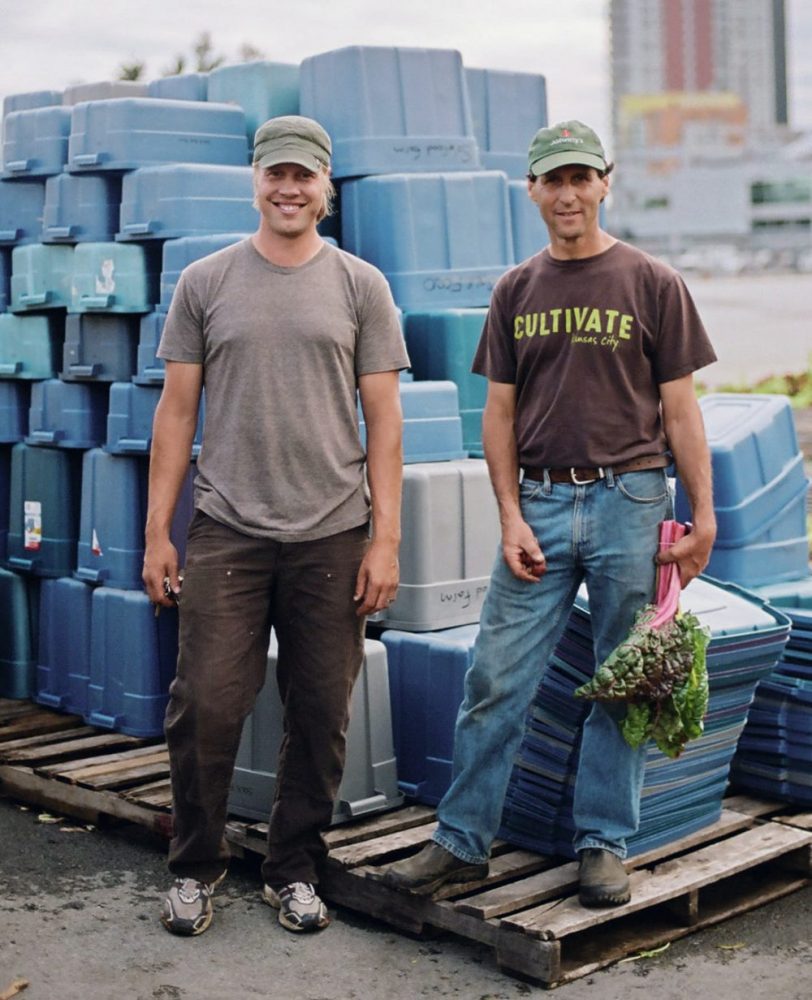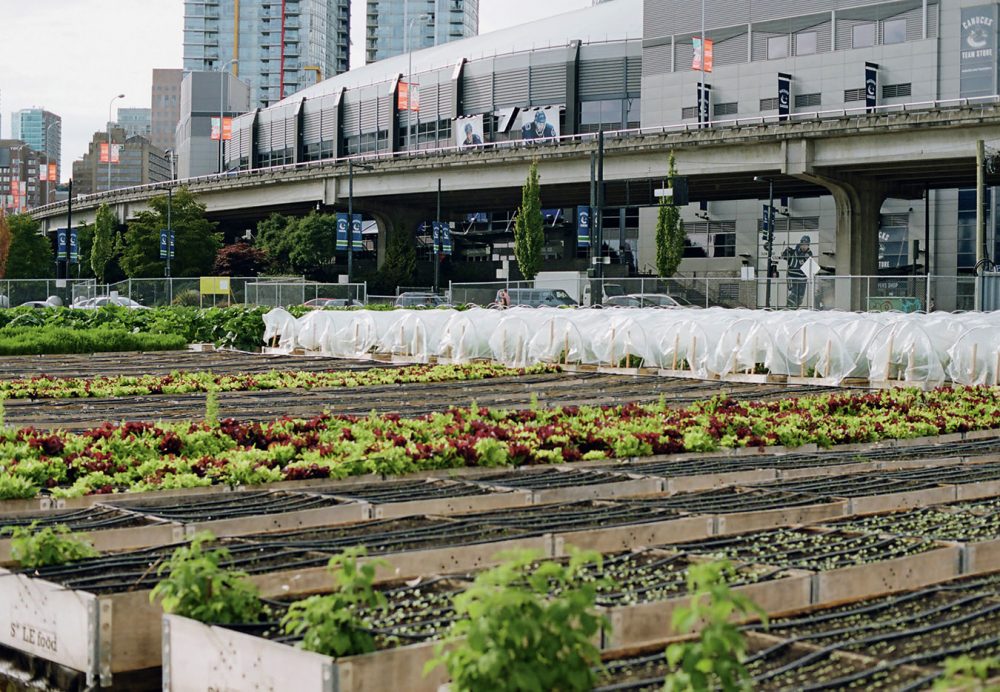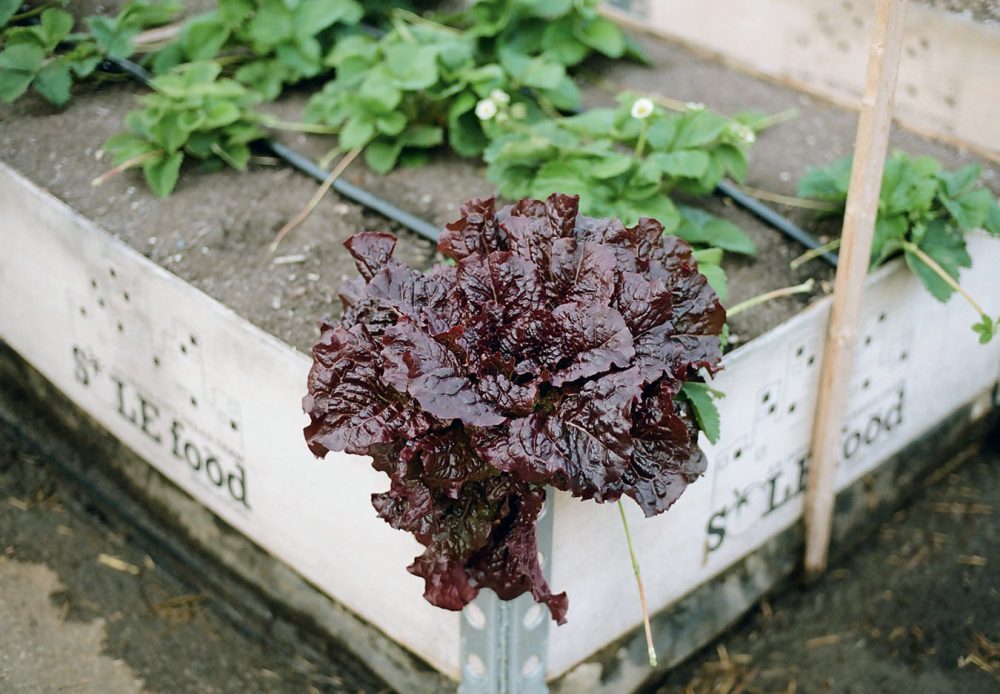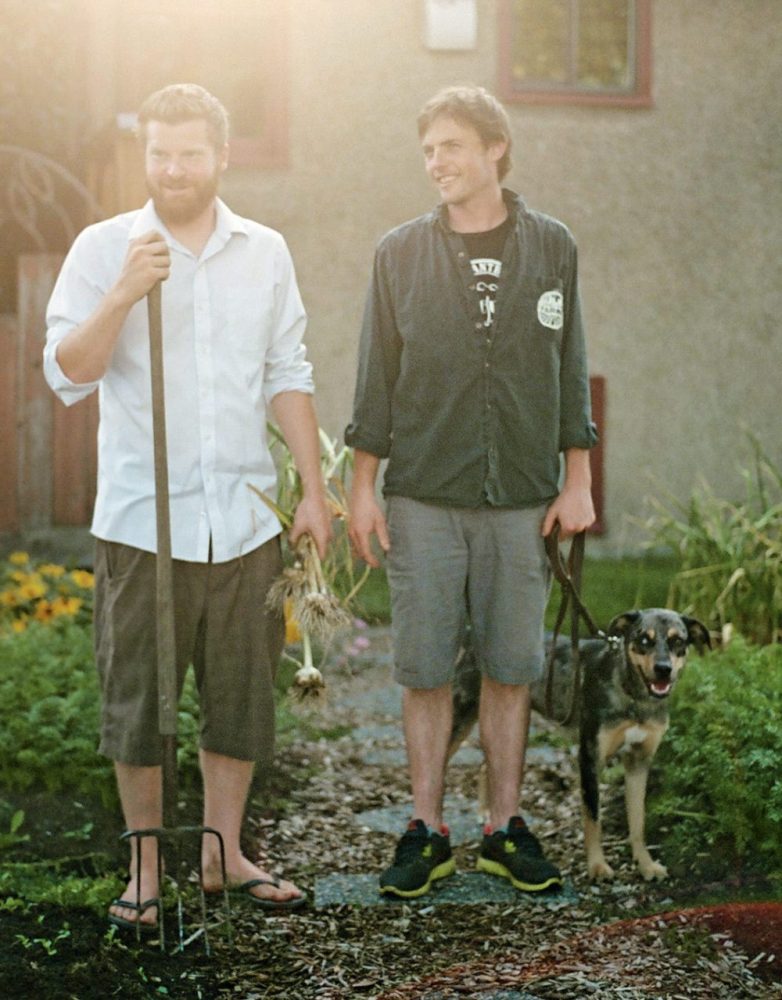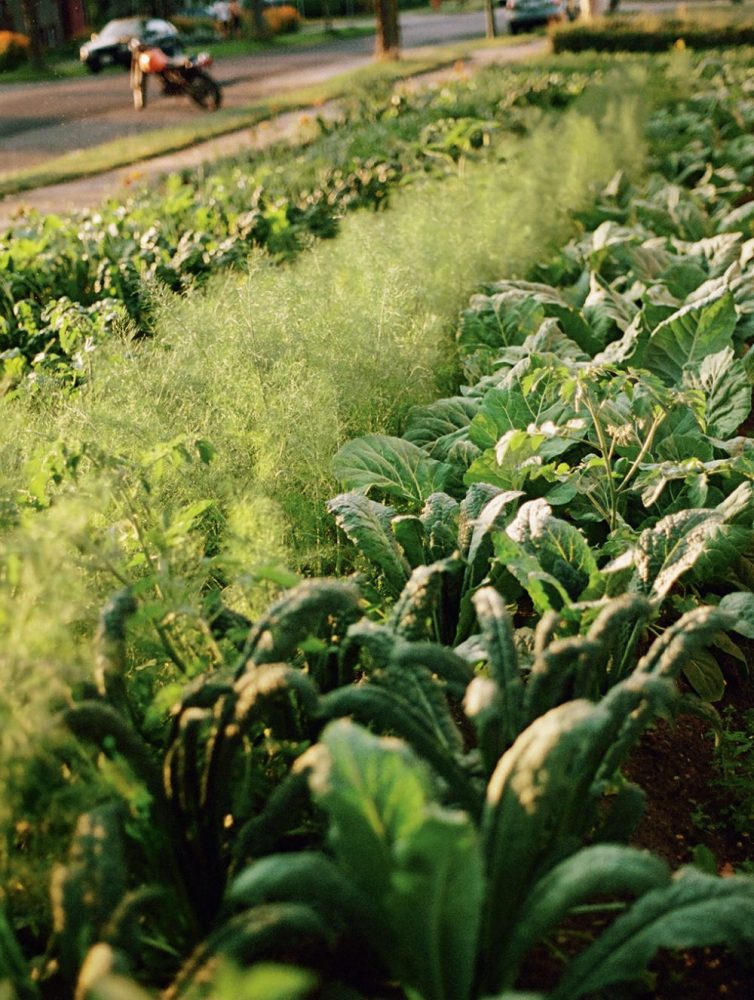Row upon row of pristine organic produce soaks up the sunshine on a cloudless late-summer day. Heirloom Scarlet Nantes carrots, sweet chocolate peppers, juicy strawberries, Technicolor rainbow Swiss chard, luscious Brandywine tomatoes; growing season is at its peak, and the crops are ready for harvest. Farm workers are busily trellising cucumbers, washing and bundling beets, weeding planting beds, and defoliating heads of cauliflower. But they set about their slate of daily duties against a cityscape of concrete and glass high-rise towers and residential streets rather than a backdrop of rolling pastures. This is the growing reality of urban agriculture, and a new vanguard of city farmers is proactively redefining the agronomic possibilities of a civic landscape.
Lisa Giroday, Sandra Lopuch, and Samantha Philips are the trifecta of inspired women behind Victory Gardens. Their company name recalls civic gardening campaigns that supported the First and Second World War efforts by alleviating the burden of food shortages and galvanizing community morale in the face of adversity and privation. These concepts of self-sustainability and social empowerment resonated with the trio of urban farmers. “In thinking of victory gardens now and their contemporary relevance, the importance is of the same magnitude but for different reasons,” says Giroday. “Today, they help foster dialog, bring communities together and reconnect us to our food sources by decreasing our reliance on unsustainable food systems.”
Since March 2012, Victory Gardens has been encouraging Vancouverites to take an active role in their own food production and cultivate their own food. Through creative use of underutilized or marginalized locations—whether a balcony, rooftop, front yard, or street boulevard—the team carves out innovative growing niches in a city where land is at a premium. “If everyone had something as simple as one tomato planter or a little patio box,” remarks Philips, “the aggregate effect would be a significant first step.”
Their diverse menu of services provides a variety of options to educate and assist both neophyte gardeners and seasoned green thumbs. Victory Gardens offer their clients consultation and garden planning, garden bed construction and installation, and ongoing garden coaching as well as a full-service seed-to-harvest package for those who like the idea of growing food but just don’t have the time to do it. Lopuch, Philips, and Giroday regularly host a broad spectrum of community events ranging from hands-on workshops to seed sales and veggie swaps, and demonstrations of maintaining, feeding, and harvesting techniques. “The diversity of our workshops helps us to connect with a larger cross-section of people and reinforce the idea that urban growing can be for anyone.”
When it comes to extending the reach of urban growing beyond a single household’s needs, the Community Shared Agriculture (CSA) economic model is an effective way for small-scale growers to pool their resources and thrive as a socially conscious alternative to the prevailing industrialized food system. Enter Inner City Farms, the collaborative effort of five friends who resolved to change their complete lack of connection to the food they were consuming. For the past three years, they have partnered with Vancouver homeowners who have a desire to contribute to the sustainability movement, converting neglected gardens and yard space into productive urban farms.
“If everyone had something as simple as one tomato planter or a little patio box, the aggregate effect would be a significant first step.”
“Front lawns have traditionally been spaces of consumption and aesthetics into which people invest time and money for little return other than leisure value or visual appeal,” explains head farmer Camil Dumont. “What we’re doing is transitioning yards from consumption to production and challenging the conventional definition of a space that’s historically rooted in aesthetics.” Instead of buying fertilizer or paying a landscaper to mow their lawns and manicure their hedges, people are putting shovels into the ground and harvesting kale and collard greens. “It’s just out of the mainstream enough to be a form of gentle resistance against the highly mechanized status quo of our existing global food cycle.”
In exchange for at least 1,000 square feet of donated land, Inner City Farms provide their property owners with a share of the produce that’s harvested from all 20 of their current plots. The collective operates under the CSA model which forges a close partnership between landholders and their farmers. It also extends to the community at large, allowing the public to purchase weekly harvest shares at the beginning of each season for a membership fee. “We do about 63 shares a week inclusive of people who provide us with farm space—that’s pretty amazing.” Harvest baskets are distributed from early June through October, and each week’s share of vegetables is generously portioned to “feed a family of four or two vegetable-loving adults”.
The five farmers and five interns spend time in their garden plots daily, and their highly visible presence generates a remarkable level of interaction with area residents. “What I didn’t see coming with this project at the beginning is the degree of educational opportunities we have,” Dumont reflects. “The number of people that stop to chat with us each day is overwhelming. Everybody has a question and we end up being de facto gardening consultants for the entire area. It’s been a very intense idea-sharing experience, and this connection to building the neighbourhood’s social fabric is much more important than the food itself.”
SOLEfood Farm takes this sense of community building and multiplies it exponentially. Its fundamental goals are twofold: to provide urban agricultural training and job opportunities for Downtown Eastside residents, and to demonstrate a credible model of agricultural enterprise that far surpasses the scale of community gardens. Co-directors Seann Dory and Michael Ableman educate and inspire 25 employees at the three city farms currently in production: their initial half-acre site inaugurated in 2009 adjacent to the Astoria Hotel on East Hastings Street; 1st Avenue and Clark Drive; and a two-acre parcel on the former Expo lands along Pacific Boulevard. Two additional sites are in progress: one underway at Main Street and Terminal Avenue and another in the Village on False Creek that will be incorporated for the 2013 growing season. Each location is either provided by the City of Vancouver or generously donated by developers via three-year leases that grant the land at no cost.
The best fertilizer is not just the farmer’s footsteps in the field. When my crew is really happy, when you can hear them joking as they work, I think that people can taste it in the food.”
All in all, it’s the largest working farm within Vancouver’s city limits, possibly even in North America, and Ableman acknowledges the unprecedented scope of SOLEfood’s social initiative. “It’s stupidly, unbelievably ambitious,” he remarks with a smile. “There’s nothing easy about this, not at this scale. It’s a huge grand experiment, and I often tell people that I’ve staked my reputation on it.” Quite a declaration as Ableman is an internationally renowned expert on organic farming, sustainable agriculture, and urban farming. A farmer for 40 years, author, photographer, and lecturer, he started the Center for Urban Agriculture in 1987 at Fairview Gardens in Southern California. He now makes his home on Salt Spring Island and alternates farming duties between SOLEfood and Foxglove Farm.
Ableman draws upon his monumental wealth of urban agricultural expertise to maximize SOLEfood’s growing efficiency within a limited amount of lateral space. Innovative techniques such as high-density seeding and vertical planting maximize space, and ensure that production levels can, to some degree, compensate for the lack of acreage. Soil biology and fertility are consistently monitored to optimize productivity of the raised planting beds. And niche varietals selected for prime flavour and beauty are displayed in a glorious riot of colour, never failing to catch the eye of potential customers. “Each of our crops is definitely worth more than its conventionally grown counterpart. But it’s not the big ideas here that are going to matter. It’s the little stuff done well that determines consistently high quality at every stage of the growing and harvest process. This the part I’m good at and it’s where SOLEfood will either succeed or fail.”
For Ableman, agriculture is a direct reflection of the project’s overall culture. “The best fertilizer is not just the farmer’s footsteps in the field. When my crew is really happy, when you can hear them joking as they work, I think that people can taste it in the food.” In passing along his wisdom to SOLEfood’s workers, the master farmer pulls no punches. “I drive people crazy, telling them, ‘This will be hard. I will demand the best from you no matter what your story is or where you came from or what you’re dealing with in your life. This is about being present, about having a reason to get up every morning, and you will learn at a level that’s really amazing.’ ” His employees rise to the challenge.
SOLEfood’s future goals targeting citywide expansion are in step with the City of Vancouver’s vis-à-vis encouraging local food production and promoting a green economy. In accordance with their mandate under the Greenest City 2020 Action Plan, their aim is to change regulations and bylaws impeding farming on both private and publicly owned land.
Lisa Giroday discusses the Vancouver Urban Farming Forum that convened last November in support of these objectives. “The city is actually reaching out and engaging in dialogue with urban farmers. They’re looking for a better understanding of the concentrations of urban farming in Vancouver as they rethink zoning restrictions and create licensing that recognize urban farming as a business,” she affirms. “We’re very excited with the proactive measures that the city is taking. Urban agriculture hasn’t been seen as a valid economic model, but now it’s in the works to have it be viable.” In a society so heavily reliant on industrialized agriculture to nourish us, the fields of our collective consciousness are ripe for change.

